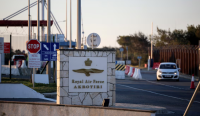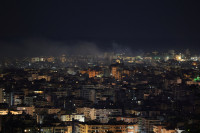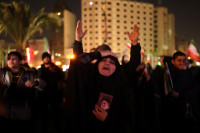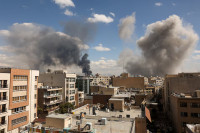World
Beslan school siege: Russia 'failed to prevent' massacre
The European Court of Human Rights has ruled that Russia failed to prevent a school siege in Beslan in 2004, in which more than 330 people died.
BBC
The European Court of Human Rights has ruled that Russia failed to prevent a school siege in Beslan in 2004, in which more than 330 people died.
The operation to end the siege, with the use of heavy weaponry, and the investigation that followed have also been strongly criticised.
In the siege, Chechen rebels took more than 1,000 hostages, mostly children.
It ended when Russian forces stormed the building. Survivors say the troops used excessive force.
No Russian official has been held responsible for the high number of deaths, which included 186 children.
What happened in Beslan?
Masked men and women, wearing bomb belts, burst into the school, opening fire in the courtyard as a ceremony marking the beginning of the school year was finishing.
The hostages were crammed into their school sports hall beneath explosives strung from the basketball hoops. Their captors were demanding Russian troops pull out of Chechnya.
The tense siege ended suddenly on the third day with two deadly explosions and intense gunfire. Witnesses described the operation by Russian security forces as chaotic, saying that the troops used excessive force and heavy weapons.
Only one of the hostage takers was caught alive and put on trial.
What do survivors and relatives say?
For more than a decade, survivors and relatives have been asking whether the siege could have been prevented and whether so many people had to die in the rescue operation.
They say officials, including President Vladimir Putin, mishandled the hostage crisis and ignored intelligence indicating that a hostage-taking scenario was being planned.
A Russian investigation into the events stalled several years ago.
So more than 400 of them applied to the European Court of Human Rights.
What has the court ruled?
The Strasbourg-based court is run by the Council of Europe, a pan-European human rights body of which Russia is a member. The council is a distinct entity and is not a branch of the European Union.
It aims to apply and to protect the civil and political rights of the continent's citizens.
It said Russia had sufficient specific information that an attack was being planned in that area, but failed to take measures to prevent it.
It also said "powerful weapons such as tank cannon, grenade launchers and flame-throwers" had been used in the school contributing to the high number of casualties.
Countries must comply with the court's verdicts, although the court cannot directly enforce this.




 9.7°C Kathmandu
9.7°C Kathmandu














